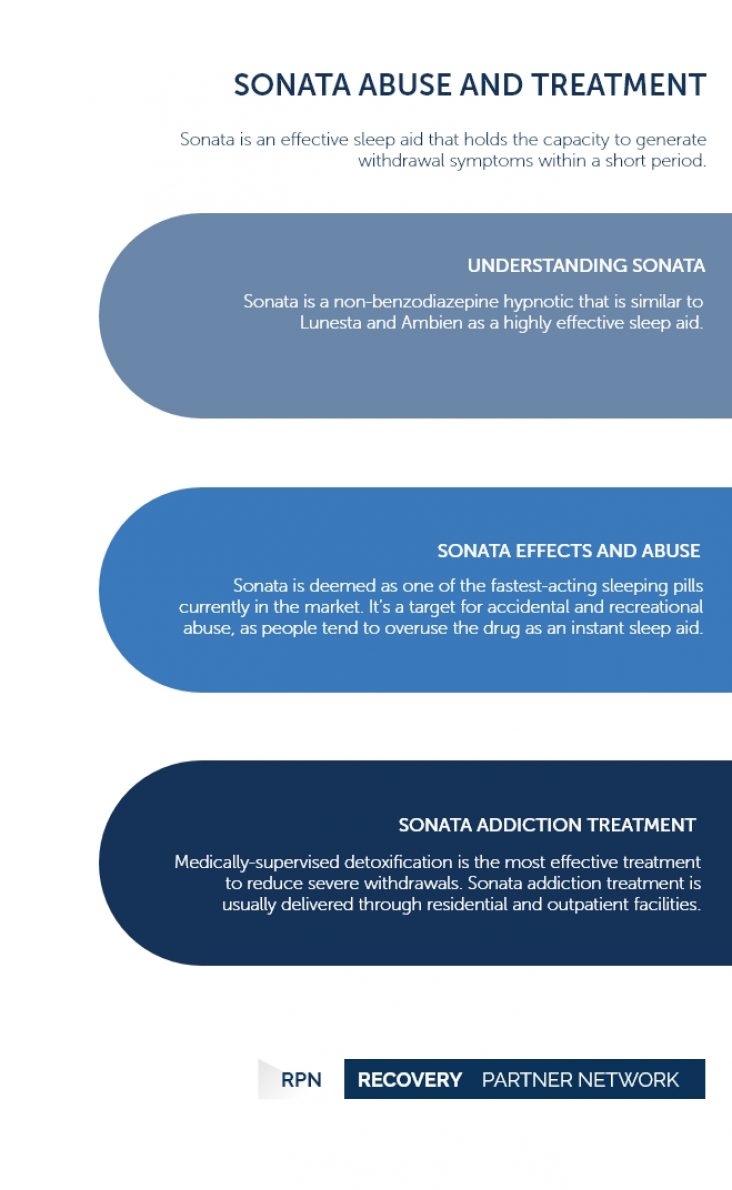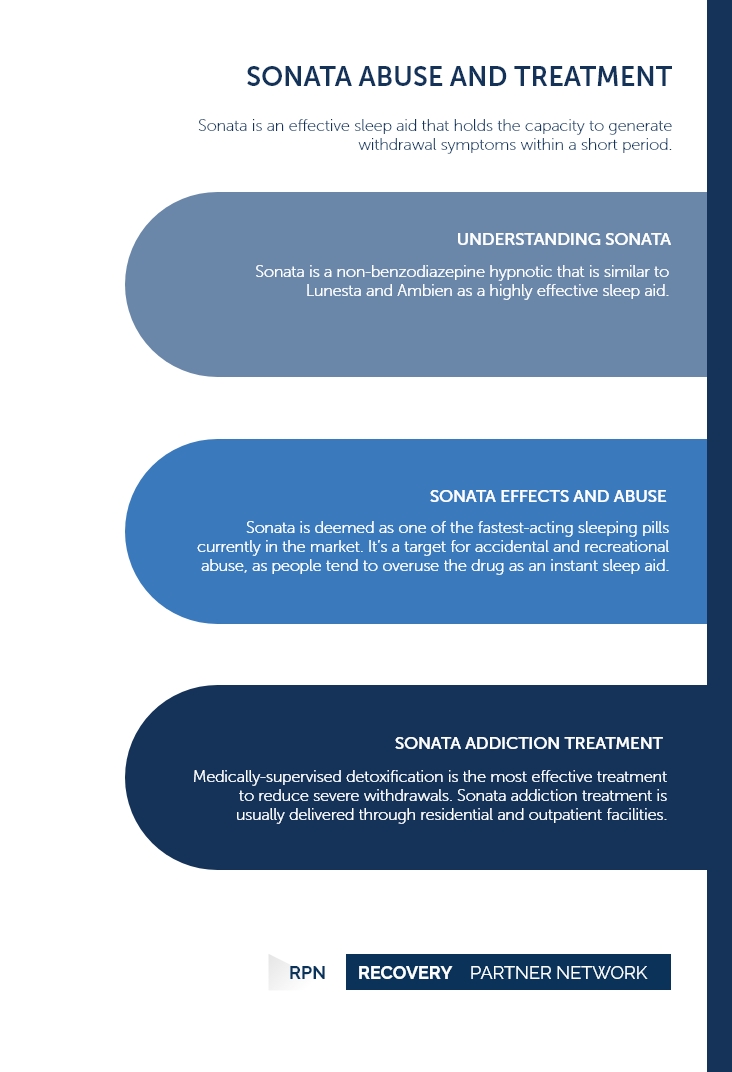Sonata is an effective sleep aid that holds the capacity to generate withdrawal symptoms within a short period.
Sonata Abuse and Treatment
Zaleplon addiction | Table of Contents
Understanding Sonata
Also known by its brand name zaleplon, Sonata is a non-benzodiazepine hypnotic that is similar to Lunesta and Ambien (the popular prescription “Z-drugs”) as a highly effective sleep aid. This medication functions by stimulating the gamma-aminobutyric acid (GABA) neurotransmitter to help slow down brain function, and eliminate feelings of anxiety, stress, and create sedative effects to help patients enjoy a restful sleep. Sonata is usually available in the form of a capsule or tablet.
Due to the rapid onset of its effects, Sonata should only be taken before bed or when an individual experiences difficulty in falling asleep. Individuals on Sonata should also refrain from participating in activities that involve full mental alertness or physical control, such as operating machinery or driving a motor vehicle.
FAQ
Sonata is used to treat people with sleep problems. Its sedative and hypnotic effects help people fall asleep faster.
Sonata should be used only as prescribed as it holds the capacity to form addiction and dependence in certain individuals.
Sonata Effects and Abuse
Sonata is deemed as one of the fastest-acting sleeping pills currently in the market, with a terminal half-life of one hour. As such, Sonata is a convenient target for accidental and recreational abuse, as people tend to overuse the drug as an instant sleep aid. Although Sonata is classed as a Schedule IV Controlled Substance, it is not perceived to be as addictive as Ambien and Lunesta. However, Sonata can bring about withdrawal symptoms if it is abruptly stopped after two weeks of daily use.
Some of the street names of Sonata are:
- Downers
- Tranks
- Sleepeasy
Sonata is not as powerful as some of its Z-drug equivalents, but it still carries a considerable risk of abuse. Individuals who abuse Sonata may crack open the capsules or smash the tablets and snort the contents to intensify the “buzz” and hallucinatory properties of the drug (which only occur at larger doses). Sonata’s sedative influence on the brain can also induce unnerving habits in users, such as sleep-walking, sleep-eating, sleep-driving, or even having intercourse while sleeping, with no recollection of it later. This is known as parasomnia. Forcing oneself to stay awake after taking Sonata or combining Sonata with alcohol or other CNS depressants can dramatically increase the likelihood of these unconscious behaviors.
Some of the other side effects of Sonata abuse are:
- Mental confusion
- Nausea
- Vomiting
- Amnesia
- Numbness or tingling sensations
- Hallucinations
- Impaired co-ordination
- Aggression
- Irritability
- Headache
- Fatigue
- Dizziness
- Stomach aches and pains
- Tremors
- Mood changes
Even though Sonata overdose is fairly uncommon, co-abusing the prescription drug with other CNS depressants such as alcohol may suppress respiratory function till complete failure or death.
FAQ
- How long does it take for Sonata to leave your system?
- Can I take 20 mg of Sonata?
- Is Sonata good for sleep?
- How much Sonata can I take?
The elimination half-life of Sonata is approximately 1 to 1.5 hours. Sonata has a rapid absorption rate.
A 20 mg dose has been shown to be tolerated by many and can be prescribed to certain patients who would not benefit from lower doses of the drug.
Sonata works faster than Ambien, but it also leaves the body faster. Therefore it might not help you stay asleep through the night.
The individual dose of Sonata recommended for each person varies. Most nonelderly adults are prescribed 10 mg.
Signs of a Sonata Addiction
It can be difficult to spot the symptoms of a Sonata addiction, especially since there is only a thin line between the addictive and prescriptive use of the drug. However, behavioral changes and any unprescribed use of Sonata should be a cause for concern.
Some of the signs of a Sonata addiction are:
- Excessive sleeping or drowsiness.
- Taking Sonata in larger doses than as prescribed.
- Administering Sonata in methods as opposed to prescription.
- Having intense cravings to use the drug.
- Developing tolerance or dependence on the drug.
- Experiencing withdrawal symptoms, such as rebound insomnia, when the drug is discontinued.
- Justifying uncharacteristic behaviors to continue using Sonata.
- Finding it difficult to quit drug use despite multiple attempts to do so.
- Neglecting responsibilities at home, school, or work.
- Finding it difficult to function normally without Sonata.
- Being preoccupied with the urge to use the drug.
- Opting to illegal behaviors to maintain Sonata addiction.
- Committing or engaging in hazardous behaviors while under the influence of the drug.
- Staying secluded from family and friends.
- Doctor shopping to obtain the drugs.
Sonata Abuse Statistics
- Approximately 60 million sleeping pill prescriptions were filled by Americans in 2011.
- Individuals who take sleeping pills retain a 44 percent increased risk of developing infections like sinusitis, upper respiratory tract infections, herpes, and more.
- About one out of 500 children in the United States is prescribed sleeping pills.
Sonata Withdrawal and Detox
Sonata’s influence on brain chemistry makes it difficult for users to function normally without it. Physical and psychological reliance on Sonata can cause debilitating withdrawal symptoms, such as hallucinations, convulsions, and even seizures. The severity and duration of these withdrawal symptoms are determined based on a number of factors such as:
- The duration and frequency of Sonata use.
- The average dose of Sonata that is generally consumed.
- The method of administration.
- Polydrug abuse (combining Sonata with other drugs or alcohol).
- The individual’s gender, body weight, and mental and medical history
Suicidal thoughts can also manifest and contribute to fatal consequences during withdrawal. Thus, medically-supervised detoxification is the most effective treatment to reduce or alleviate severe withdrawals, facilitate behavioral observation, and minimize the possibility of relapses.
Sonata Addiction Treatment
Treatment programs for Sonata addiction are usually delivered through residential and outpatient facilities, with the level of care determined based on a number of factors such as:
- The amount of support at home.
- The type and method of drug abuse.
- The severity of drug dependence.
- Any underlying medical or mental health issues.
Nevertheless, a substance abuse assessment by an addiction professional should be completed before admission to any rehab to help each patient make the right choice of treatment for them.
Inpatient Sonata Rehab
Inpatient rehabs offer around the clock supervised care and support, including psychiatric and physical health assistance, at live-in facilities. The ultimate goal of inpatient rehabs is to help patients restructure an independent lifestyle without the need for Sonata over an average period of 30 to 90 days based on each patient’s requirements. Inpatient rehabs also provide patients with education and insight into the disease of addiction as well as healthy coping skills for relapse prevention, trauma, anxiety, depression, and other issues.
Outpatient Sonata Rehab
Outpatient rehabs do not require patients to stay at a treatment facility or undergo monitored medical care. As such, these facilities are most suitable for patients with unavoidable commitments or responsibilities at school, work, or home. Outpatient rehabs can also be used as an aftercare or step-down program upon completing an inpatient program to help patients transition back to their daily lives while also maintaining recovery.
Some patients may engage in outpatient rehabilitation while living in a sober home or apartment where drugs and alcohol are prohibited. In sober homes, tenants are usually subjected to regular drug screening and curfews to ensure sobriety.
There are various types of outpatient rehabs available to suit varying patient needs. Outpatient programs generally require patients to meet at least a couple of times a week for a few hours.
Outpatient treatment program often provides:
- Group therapy
- Individual therapy
- Family therapy
- Specialized therapy, such as art or music therapy.
Therapy for Sonata Addiction
Sonata addiction treatment may necessitate the use of several therapies to help a patient recover. Some of these therapies are:
Therapies such as motivational interviewing (MI) and cognitive-behavioral therapy (CBT) teach healthy coping mechanisms for stress and help patients discover the root cause of their drug abuse. MI is a non-confrontational approach that assists patients in finding the internal motivation to change while also learning how to accept who they are, whereas CBT works to transform negative thoughts into positive ones to influence self-esteem and behavior.
These are the typical components of Sonata abuse treatment that equips patients with relapse prevention techniques and communication skills. Patients can also build support groups through these sessions to create a network of peers with a shared purpose and desire to stay drug-free.
Improving Sleep in Sonata Addiction Treatment
As Sonata is prescribed as a sleep aid, individuals addicted to the drug may grapple with sleeping difficulties during the cessation of the drug. Thus, engaging in holistic therapy during Sonata treatment and recovery can be helpful in improving sleep.
Some of the holistic practices may include:
- Yoga
- Meditation
- Mindfulness techniques
- Chiropractic care
- Stress management techniques
- Acupuncture
- Massage therapy
- Nutritional meal planning
- Fitness programs
Reducing stress and anxiety through antidepressant or anti-anxiety drugs may also be helpful. When someone is well-rested, he/she is in a better position to handle stressors and think clearly. Thus, improving the quality of sleep can improve the overall effectiveness of recovery treatment.
A few tips to improve sleep are:
- Create a consistent sleep schedule
- Have a balanced diet
- Avoid caffeine
- Engage In daily physical activities
- Use relaxation techniques
- Avoid taking naps in the evening
- Avoid stimulation before bed
- Keep the room dark and use it only for sleeping
Recovery Partner Network
We aim to educate and empower. If you feel our library of resources does not cover your specific need, reach out to us, and we would be happy to help.
STATISTICS
© Copyright 2025


